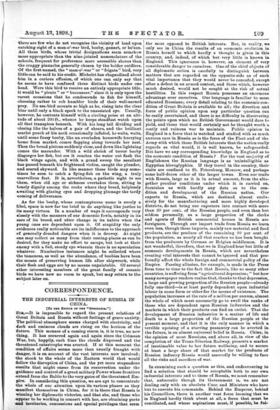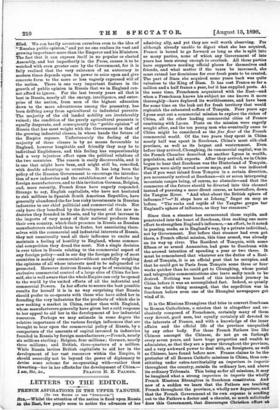CORRESPONDENCE.
THE INDUSTRIAL INTERESTS OF RUSSIA IN CHINA.
ET° THZ EDITOR OF TIM SFHOTATOR:.] Sze, It is impossible to regard the present relations of Great Britain and Russia without feelings of grave anxiety. The political atmosphere seems charged with electricity, and dark and ominous clouds are rising on the horizon of the I uture. This menace of a coming storm is, it is true, no new thing. It has occurred again and again since the Crimean War, but, happily, each time the clouds dispersed and the 'threatened catastrophe was averted. If at this moment the 'condition of affairs seems more than usually fraught with 'danger, it is on account of the vast interests now involved; 'the shock to the whole of the Eastern world that would 'follow the disruption of China, and the yet more stupendous 'results that might ensue from its resurrection under the :guidance and control of a great military Power whose frontiers 'extend from the Baltic to the very gates of the threatened Em- pire. In considering this question, we are apt to concentrate the whole of our attention upon its various phases as they manifest themselves in China, for it is there that Russia is winning her diplomatic victories, and that she, and those who appear to be working in concert with her, are obtaining ports and territories, concessions and special privileges that seem
the most opposed to British interests. But, in reality, we only see in China the results of an economic evolution in Russia herself to which hardly a thought is given in this country, and, indeed, of which but very little is known in England. This ignorance is, however, an element of very considerable danger to ourselves. One of the chief objects of all diplomatic action is carefully to distinguish between matters that are regarded on the opposite side as of such vital importance that they would never be conceded, except after a defeat in an armed contest, and those which, however much desired, would not be sought at the risk of actual hostilities. In this respect Russia possesses an enormous advantage over ourselves. Our language is familiar to most educated Russians; every detail relating to the economic con- dition of Great Britain is available to all; the direction and force of public opinion upon any particular question can be easily ascertained, and there is no difficulty in discovering the points upon which no British Government would dare to yield, and those that would certainly not be thought worth a costly and ruinous war to maintain. Public opinion in England is a force that is watched and studied with as much anxious care in Russia as is the force of the Fleet and of the Army with which those British interests that the nation really regards as vital would, it is well known, be safeguarded. But have we any corresponding knowledge in England as to the economic condition of Russia ? For the vast majority of Englishmen the Russian language is as 'unintelligible as Egyptian hieroglyphics. If they travel in the country, their visits are confined to St. Petersburg, Moscow, and perhaps some half-dozen other of the larger towns. Even our trade with Russia, large as it is in actual amount, from the alto- gether peculiar conditions under which it is carried on, furnishes us with hardly any data as to the con- dition and development of the Russian nation. Our exports to Russia, which are destined almost exclu- sively for the manufacturing and more highly developed districts, do not bring our exporters into contact with more than 20 per cen. of the Russian people, and even then but seldom personally, as a large proportion of the clerks and agents of British commercial houses in Russia are foreigners. Through our import trade from Russia we learn even less, though these imports, mainly raw material and food products, are the produce of the remaining 80 per cent. of the population, as nearly all that reaches us has been bought from the producers by German or Belgian middlemen. It is not wonderful, therefore, that we in England hear but little of economic developments in Russia, which are nevertheless creating vital interests that cannot be ignored and that pro• foundly affect the whole foreign and commercial policy of the Empire. Passing allusion, for example, is made in the Press from time to time to the fact that Russia, like so many other countries, is suffering from "agricultural depression; " but how many newspaper readers realise that, thanks to that depression, a large and growing proportion of the Russian people—already fully one-third—is at least partly dependent upon industrial labour in some form or other for the means of existence. The population increases at the rate of a million per annum, almost the whole of which must necessarily go to swell the ranks of those who are dependent upon Russian industries and the markets in which their products can find an outlet. That the development of Russian industries is a matter of life and death to a large proportion of the Russian people at the present moment, and that it is the only manner in which a, terrible uprising of a starving peasantry can be averted in the future, is an almost universal belief in Russia. China, in the opinion of most Russians, and above all, in view of the completion of the Trans-Siberian Railway, presents a market of inestimable value to her future wellbeing, and to secure at least a large share of that market for the products of Russian industry Russia would assuredly be willing to face all the risks and sacrifices of war.
In examining such a question as this, and endeavouring to find a solution that should be acceptable both to our own industrial interests and to those of Russia, we must remember that, autocratic though its Government is, we are not dealing only with an absolute Czar, and Ministers who have but to execute his commands. Behind the Emperor, behind his Councillors, there is another vast force looming that we in England hardly think about at all, a force that must be conciliated, and whose aspirations must, if possible, be ful• filled. We can hardly accustom ourselves even to the idea of "Russian public opinion," and yet no one realises its vast and growing importance more than the Emperor and his Ministers. The fact that it can express itself in no popular or elected _Assembly, and but imperfectly in the Press, causes it to be watched with even greater care by the Government, for it is fully realised that the very existence of an autocracy in modern times depends upon its power to seize upon and give concrete form to the more or less vaguely expressed will of the nation. There is one very important feature in the growth of public opinion in Russia that we in England can- not afford to ignore. For the last twenty years all that is best in Russia, nearly all the energy, intelligence, and enter- prise of the nation, from men of the highest education down to the more adventurous among the peasantry, has been drifting away from agricultural to industrial pursuits. The majority of the old landed nobility are irretrievably ruined ; the condition of the purely agricultural peasants is equally desperate, and consequently the "public opinion" of Russia that has most weight with the Government is that of the growing industrial classes, in whose hands the future of the Empire reposes. Unfortunately the feeling of the majority of these classes is by no means favourable to England, however hospitable and friendly they may be to individual Englishmen, and this feeling has unquestionably had a very injurious effect upon the political relations of the two countries. The reason is easily discoverable, and it is one that might have been, and might still be, remedied, with double advantage to ourselves. It has long been the policy of the Russian Government to encourage the introduc- tion of new industries and the establishment of factories by foreign manufacturers, and to this invitation German, Belgian, and, more recently, French firms have eagerly responded. Strange to say, English capitalists, who have not hesitated to risk millions in Spanish South American Republics, have generally abandoned the far less risky investments in Russian industries to our chief politicial and commercial rivals. Not only have they benefited by the development of the new in- dustries they founded in Russia, and by the great increase in the imports of very many of their national products from their own country, which their presence in Russia as Russian manufacturers enabled them to foster, but associating them- selves with the commercial and industrial interests of Russia, they not unnaturally used all their influence to excite and maintain a feeling of hostility to England, whose commer- cial competition they dread the most. Not a single decision is ever taken in Russia relating to the commercial aspect of any foreign policy—and in our day the foreign policy of most countries is mainly commercial—without carefully weighing the opinions of all whose interests need to be safeguarded or promoted. However desirous Russia may be of retaining the exclusive commercial control of a large slice of China for her- self, she is well aware that the whole Empire can only be opened to the world by the united efforts of all the industrial and commercial Powers. In her efforts to secure the best possible results for herself it is in no way surprising that Russia should prefer to co-operate with those who have aided her in founding the very industries for the products of which she is now seeking a market in China, rather than with England, whose manufacturers generally have given but a cold response to her appeal to aid her in the development of her industrial resources. Perhaps we may estimate in some degree the relative importance of the various foreign influences that are brought to bear upon the commercial policy of Russia, by a comparison of the amounts of capital invested in industries founded in Russia by foreign manufacturers ;—French, nearly six millions sterling ; Belgian, four millions ; German, nearly three millions; and British, three-quarters of a million. While Russia invites British capitalists to aid her in the development of her vast resources within the Empire, it should assuredly not be beyond the power of diplomacy to devise some scheme for co-operating with—rather than thwarting—her in her efforts for the development of China.—



































 Previous page
Previous page